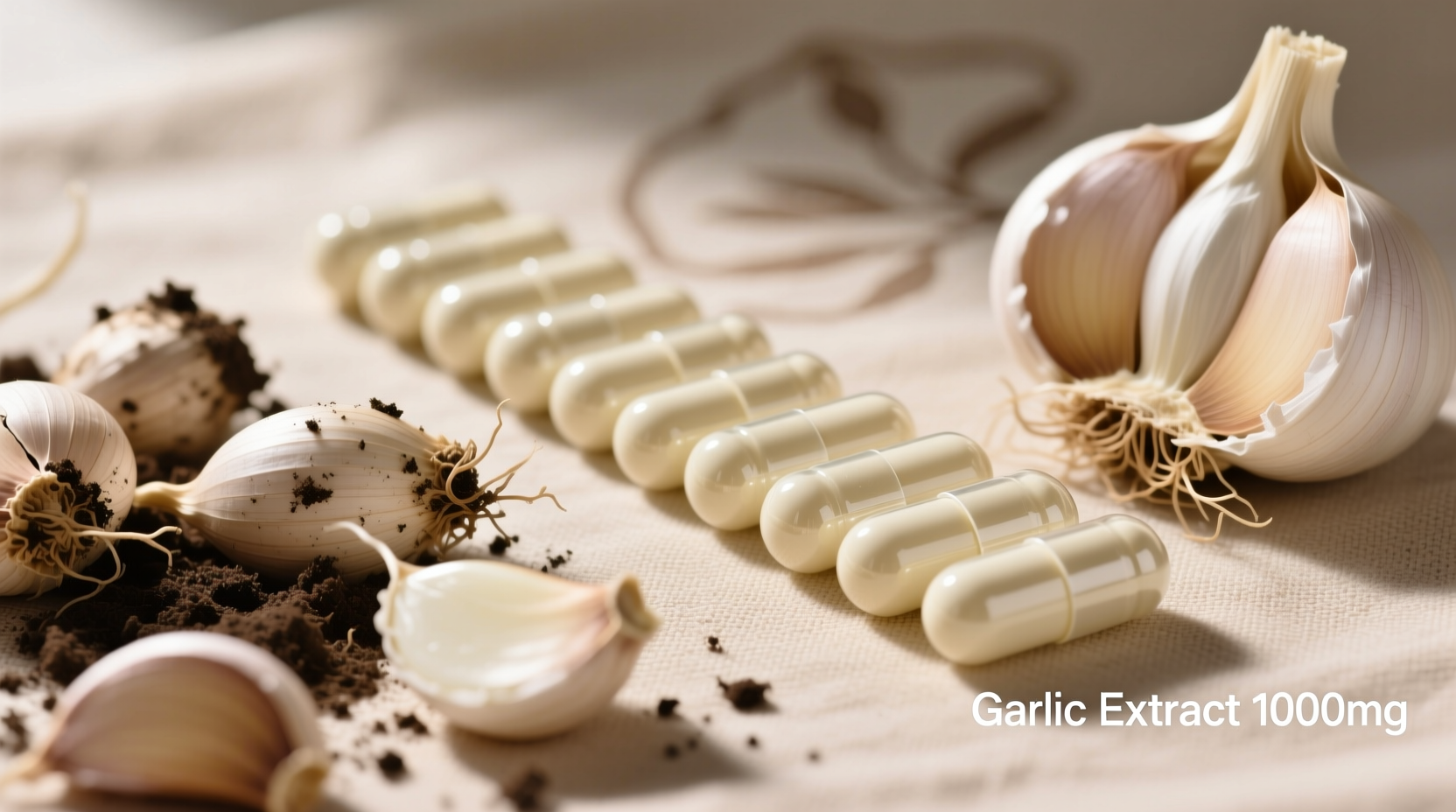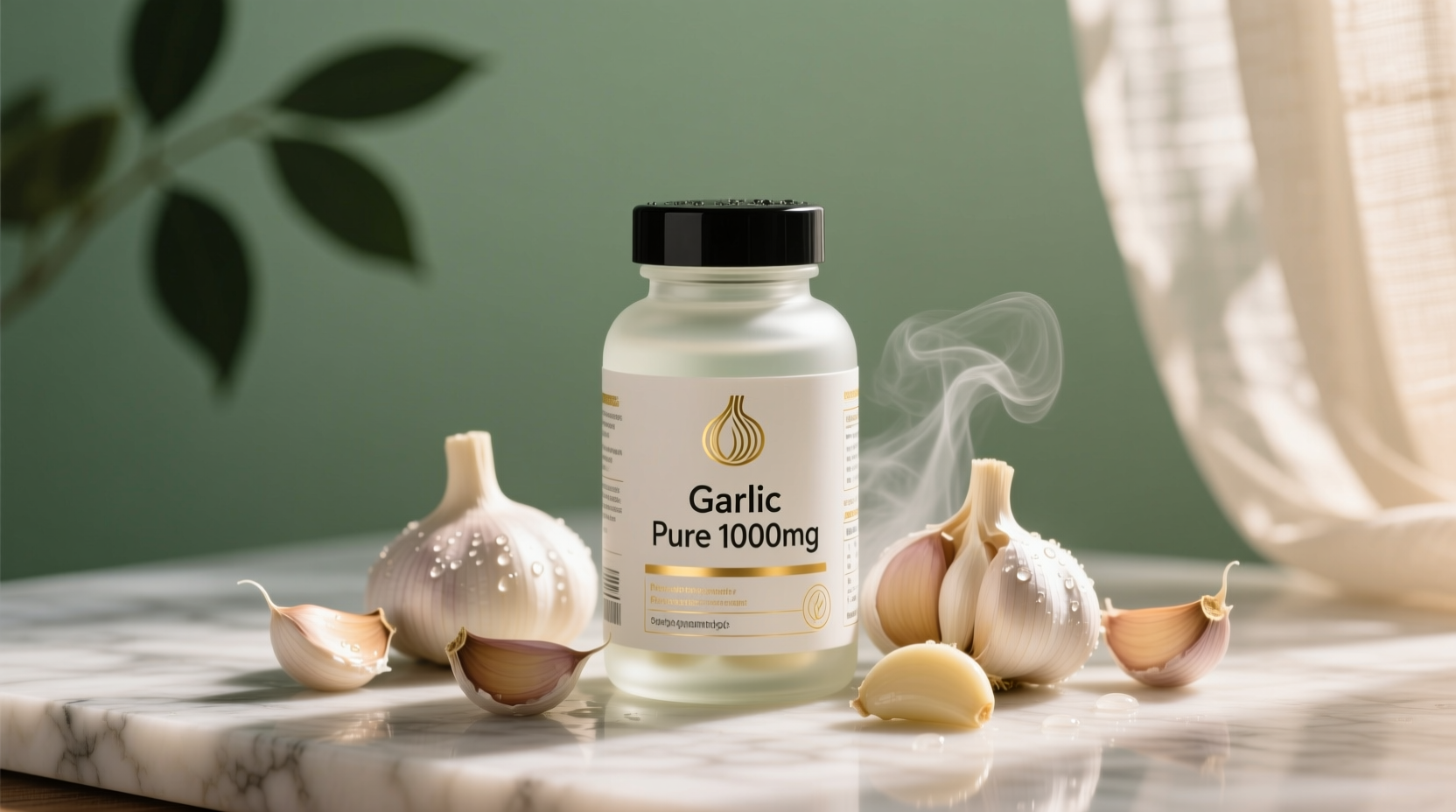Garlic supplements may provide modest cardiovascular benefits, particularly for blood pressure reduction, according to current research. However, they're not a substitute for prescribed medications and effects vary significantly based on supplement quality and formulation. The most effective supplements contain stabilized allicin, with typical doses ranging from 600-1,200 mg daily, but potential interactions with blood thinners require medical consultation before use.
For centuries, garlic has been valued not just as a culinary staple but as a traditional remedy. Today, garlic supplements offer a convenient alternative to fresh garlic, but understanding their actual benefits and limitations requires sorting through marketing claims and scientific evidence. This guide cuts through the confusion with research-backed information to help you make informed decisions about whether garlic supplements might benefit your health regimen.
What Science Actually Says About Garlic Supplements
Unlike many supplement claims, garlic has substantial research behind it, though results are more nuanced than marketing suggests. The active compound allicin—formed when garlic is crushed or chopped—demonstrates potential cardiovascular benefits, but its stability in supplements varies dramatically.
According to a comprehensive review published in Advances in Nutrition, garlic supplements show consistent modest effects on blood pressure, with reductions averaging 5-8 mmHg in systolic measurements among hypertensive individuals. However, effects on cholesterol levels remain inconsistent across studies, with some showing minor improvements in LDL cholesterol while others show no significant change.
| Health Benefit | Research Consistency | Average Effect Size | Evidence Strength |
|---|---|---|---|
| Blood Pressure Reduction | High | 5-8 mmHg systolic | Strong |
| Cholesterol Improvement | Moderate | Minor LDL changes | Moderate |
| Immune Support | Low | Inconclusive | Weak |
| Cold Prevention | Moderate | Reduced frequency | Moderate |
This evidence comparison shows why understanding what garlic supplements can and cannot do matters. While blood pressure benefits appear most consistent, don't expect dramatic results—these supplements work subtly over time rather than providing immediate effects.
Garlic Supplements vs. Fresh Garlic: What's the Difference?
Many assume supplements simply concentrate fresh garlic's benefits, but the reality involves complex chemistry. When you crush fresh garlic, the enzyme alliinase converts alliin to allicin—the compound responsible for most health benefits. However, allicin is unstable and breaks down quickly.
Supplement manufacturers use various approaches to address this:
- Garlic powder tablets: Contain dried garlic powder with alliin, but require stomach acid to activate alliinase
- Enteric-coated tablets: Protect alliinase from stomach acid, allowing activation in the intestines
- Aged garlic extract: Contains stable compounds like S-allyl cysteine rather than allicin
- Oil-macerated products: Contain garlic oil compounds with different properties
The National Center for Complementary and Integrative Health notes that allicin yield varies from 0.1% to 2.5% in commercial products, explaining why effectiveness differs so widely between brands. For reliable results, look for products specifying allicin potential or yield on the label.

Choosing Quality Supplements: What Matters Most
With minimal FDA regulation of supplements, selecting effective garlic products requires careful evaluation. Consider these evidence-based selection criteria:
Formulation Matters More Than Price
Research from the National Center for Complementary and Integrative Health indicates that enteric-coated tablets providing 1.3% allicin typically deliver more consistent results than standard garlic powder. Look for products specifying:
- Allicin potential (minimum 4,000 mcg per dose)
- Third-party testing verification (USP, NSF, or ConsumerLab)
- Clear dosage instructions matching research protocols
Avoid Common Quality Pitfalls
Many budget supplements contain insufficient active compounds. A ConsumerLab analysis found some products delivered less than 10% of promised allicin. Others contain unnecessary fillers that reduce effectiveness. Steer clear of products making extraordinary claims like "20x strength" without verification.
Practical Usage Guidelines: Dosage and Timing
Research suggests optimal dosing follows these evidence-based parameters:
- Daily amount: 600-1,200 mg of garlic powder extract divided into 2-3 doses
- Timing: With meals to reduce gastrointestinal side effects
- Duration: Minimum 8-12 weeks to assess effects on blood pressure
- Consistency: Daily use required as benefits accumulate gradually
Unlike medications, supplements don't provide immediate results. Track your blood pressure regularly if using garlic for cardiovascular support, and maintain realistic expectations about modest improvements rather than dramatic changes.
Critical Safety Considerations You Must Know
Garlic supplements interact with several common medications, making medical consultation essential before use:
- Blood thinners: May increase bleeding risk when combined with warfarin or aspirin
- HIV medications: Can reduce effectiveness of saquinavir
- Birth control: Theoretical interaction though evidence remains limited
Common side effects include bad breath, body odor, heartburn, and gastrointestinal discomfort. The European Medicines Agency recommends discontinuing use at least 1-2 weeks before surgery due to bleeding risk. Pregnant women should avoid high-dose supplements without medical supervision.
Remember that supplements aren't replacements for prescribed medications. If you have hypertension or cardiovascular concerns, continue prescribed treatments while discussing supplement use with your healthcare provider.
When Garlic Supplements Make Sense (And When They Don't)
Based on current evidence, garlic supplements may provide modest benefits in specific situations:
- As complementary support for mild hypertension (with medical approval)
- For individuals unable to consume sufficient fresh garlic regularly
- During cold season for potential immune support
They're less appropriate when:
- Taking blood-thinning medications without medical supervision
- Expecting significant cholesterol reduction as primary treatment
- Seeking immediate health improvements
The evolving research timeline shows increasing understanding of garlic's mechanisms. While early studies focused on observational benefits, current research examines specific compounds and their interactions at the molecular level. This progression suggests future supplements may offer more targeted benefits as research continues.
Final Considerations for Informed Decisions
Garlic supplements offer potential health benefits but require realistic expectations and careful selection. They work best as part of a comprehensive approach to cardiovascular health that includes diet, exercise, and medical care when needed. Prioritize quality products with verified allicin content, understand their limitations compared to fresh garlic, and always consult your healthcare provider before adding supplements to your regimen—especially if managing health conditions or taking medications.











 浙公网安备
33010002000092号
浙公网安备
33010002000092号 浙B2-20120091-4
浙B2-20120091-4